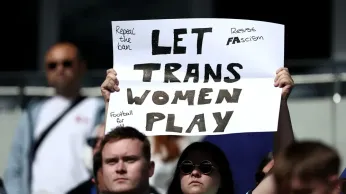
3 hours ago
Trump Administration Bars Transgender Women Athletes from ‘Extraordinary Ability’ Visas
READ TIME: 3 MIN.
The Trump administration has introduced sweeping changes to U.S. visa policy that block transgender women athletes from obtaining the so-called “extraordinary ability” visas, effectively barring them from entering the United States to compete in women’s sports. The announcement, made public on August 5, 2025, marks a significant escalation in efforts to restrict transgender participation in athletics at a national level, and comes amid ongoing debate over the rights of transgender individuals in sports and society at large .
The U.S. Citizenship and Immigration Services (USCIS) clarified that eligibility for key visa categories—including O-1A visas for individuals of “extraordinary ability” and EB-1 visas for outstanding athletes—would now be restricted to those whose sex as listed on their passport or birth certificate matches their sex assigned at birth . The new policy applies not only to athletes, but to other extraordinary ability visa categories, with particular attention on sports.
A spokesperson for USCIS, Matthew Tragesser, stated that the policy’s intent is to close what the administration describes as a “loophole” that allowed “male athletes whose only chance at winning elite sports is to change their gender identity and leverage their biological advantages against women” to compete in women’s sports . Tragesser added, “It’s a matter of safety, fairness, respect, and truth that only female athletes receive a visa to come to the US to participate in women’s sports. The Trump Administration is standing up for the silent majority who’ve long been victims of leftist policies that defy common sense,” he said .
The policy directive affects at least three major visa categories: O-1A (for individuals of extraordinary ability in athletics), EB-1 (for individuals with extraordinary ability in various fields including sports), and national interest waivers used for green card applications in cases where the applicant’s work benefits the U.S. . It comes in the wake of a February 2025 executive order from President Trump, which directed federal agencies to interpret sex under Title IX strictly as sex assigned at birth, and led to the NCAA banning transgender women from women’s collegiate sports .
LGBTQ+ advocacy groups and civil rights organizations have denounced the new policy as discriminatory, arguing that it singles out transgender individuals for exclusion on the basis of gender identity. Legal experts warn that the policy raises serious concerns regarding equal protection under the law and the U.S.’s obligations under international human rights agreements .
“The administration’s explicit targeting of transgender women athletes for exclusion is both cruel and unlawful,” said a spokesperson for the Human Rights Campaign (HRC), noting that the new directive builds on a series of actions that have rolled back protections for transgender people in education, healthcare, and public life . The National Center for Transgender Equality similarly condemned the policy, calling it “a transparent attempt to erase transgender people from public life, sports, and opportunity” .
The American Civil Liberties Union (ACLU) issued a statement suggesting that the policy may face immediate legal challenges on constitutional grounds, particularly regarding equal protection and due process .
International sports federations and Olympic committees have yet to release formal statements, but the U.S. policy shift could have far-reaching consequences for international athletic competition, especially as the United States prepares to host major sporting events in the coming years . Athlete advocates warn that the policy will not only impact transgender women seeking to compete in the United States, but could also set a precedent for similar restrictions in other countries.
Transgender athletes and their allies voiced concern about the message the policy sends to young transgender people in sports around the world. “Policies like this tell transgender youth that their dreams are not valued,” said a spokesperson for Athlete Ally, an organization promoting LGBTQ+ inclusion in sports .
The visa policy follows a pattern of legislative and executive actions aimed at limiting transgender participation in sports and public life. In February 2025, President Trump issued an executive order, “Keeping Men Out of Women’s Sports,” requiring all federal agencies to interpret sex as assigned at birth for the purposes of Title IX funding . The State Department’s new guidance, issued by Secretary Marco Rubio on February 24, 2025, directed consular officials to deny visas to athletes whose “sex marker does not align with their sex assigned at birth,” requiring additional evidence in cases of discrepancy .
These measures have already resulted in confusion and concern among U.S. colleges, athletic programs, and international sports organizations, as institutions struggle to comply with both federal policy and anti-discrimination laws .
As legal challenges loom and the international sporting community weighs its response, the future of transgender athletes’ participation in U.S. events remains uncertain. LGBTQ+ advocates emphasize the importance of continued visibility and support for transgender athletes, both in the United States and globally .






